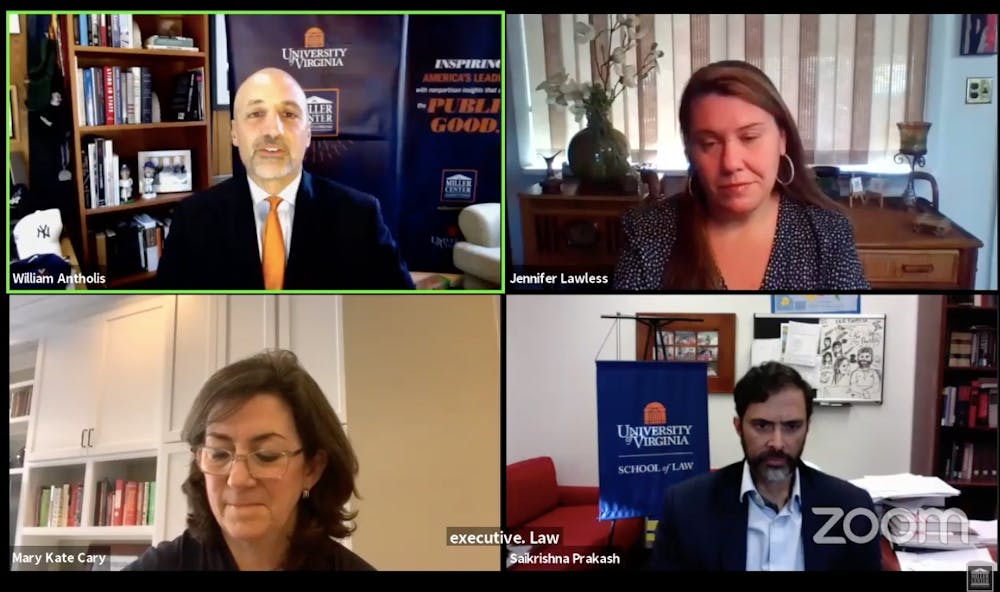During a Miller Center discussion Wednesday, panelists representing the Miller Center and Politics Department analyzed exit polling statistics and electorate data to provide the University community with clarifications and predictions about the outcome of the 2020 presidential election. During the discussion, all four panelists — Saikrishna Prakash, Law professor and Miller Center senior fellow, politics Prof. Jennifer Lawless, Miller Center Director William Antholis, and Mary Kate Cary, Miller Center practitioner senior fellow — said that the election was too close to call and fielded questions about the closeness of the race and what the ultimate result could mean for the future of each party and the nation.
Starting Tuesday night, states began to count ballots, and as of Thursday, these ballots have been tallied to the current 253 Electoral College votes for former Vice President Joe Biden and 214 for President Donald Trump. The states of Georgia, North Carolina, Pennsylvania, Arizona and Nevada are still too early to call, as thousands of mail-in ballots still need to be counted. Trump possesses the lead in the first three, though the margin is narrowing, while Biden holds the lead in Arizona and Nevada. Biden holds a 39-vote lead for the presidency, while the Senate majority has not yet been claimed by either party.
“Today's program is part of a much broader effort across the University of Virginia to help bring some enlightenment, understanding and maybe even some clarification and correction to our confusing system that was in many ways designed here in Central Virginia,” Antholis said.
The Miller Center is a nonpartisan affiliate of the University that works to “apply the lessons of history and civil discourse to the nation's most pressing contemporary governance challenges,” according to their mission statement.
Regardless of the potential that the tightness of the election could manifest lawsuits, recounts or faithless electors, Lawless said that it seems that Biden will win the 270 Electoral College votes needed to secure the presidency. Biden secured Michigan around 5 p.m. Wednesday and currently holds a lead in undecided Arizona and Nevada — thus, the fate of Pennsylvania, an important battleground state, may not even be crucial to the victor of the election, Lawless said, as Biden winning both Nevada and Arizona would give him the necessary 270 electoral votes.
Prakash said that the drawn-out nature of ballot counting this year is reminiscent of the presidential election between George Bush and Al Gore in 2000.
“It's been very emotionally taxing for people, especially those who are deeply invested in a particular candidate winning,” Prakash said. “This sort of seems like 2000, except that it might be that Trump is the one asking for recounts … The question, I think, for Trump is, does he really want to do this? Does he really have a path to victory by asking for recounts everywhere and trying to have ballots thrown out?”
Exit polls showed that 94 percent of Republicans voted for Donald Trump and 93 percent of Democrats voted for Joe Biden, according to Lawless. This polarization, Cary said, is the main contributor to a concept known as the “shy Trump” and the “shy Biden” voter phenomena, which refers to individuals who tend to not publicly show their support for a political candidate but still end up voting for them at the polls.
According to the panelists, this is why Trump could have racked up more votes than polling initially indicated. Voters who didn’t necessarily like Trump may have voted for him, but didn’t want to come out and say it — a phenomenon that potentially skewed exit polling data towards Biden and thus impacted predictions of the election’s overall outcome.
“I think the polling and the media complex have really taken a black eye on this and I completely agree,” Cary said. “The polling industry has really done it to themselves, and this is a big problem. There's gonna be a lot of people going forward who really looked at these polls with a lot of skepticism, the next few elections.”
Another point of curiosity was the question of whether or not “Trumpism” — the president’s right-wing political ideology that emphasizes opposition to the establishment — will still prevail even if Trump does not win. The answer lies in how, if Biden wins, he will collaborate with the likely Republican Senate and Majority Leader Mitch McConnell, Cary said.
“[I] think that Mitch McConnell's goal is going to be to make Joe Biden a one-term president,” Lawless said. “It's not only because he doesn't agree with Joe Biden's agenda — it's also because his life becomes way easier when he has unified party control, and the Democrats feel the same way given that the entire House is up for reelection in two years [and] that there are a bunch of Senate races in two years.”
According to Lawless, if Biden wins the presidency, he can “undo” everything Trump has done with executive orders and general policy shifts. However, Cary said that Senate approval of upcoming policies — especially in regards to COVID-19 — will depend on how far left Biden decides to operate as president.
The Miller Center has more information on the breakdown of this election on their website, where individuals can register for the final talk of the three-panel series addressing the presidential election, which is Friday at 3:30 p.m. The second panel was hosted Thursday at 3:30 p.m.







